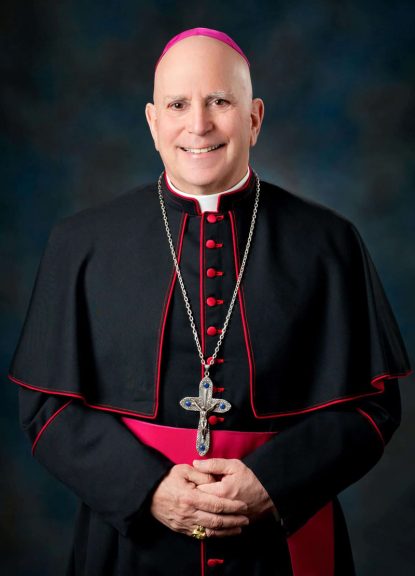
Denver Archbishop Samuel J. Aquila is pictured in an undated photo. On Oct. 7, 2019, Archbishop Aquila, Bishop Michael J. Sheridan of Colorado Springs, Colo., and Bishop Stephen J. Berg of Pueblo, Colo., announced the opening of the Colorado Independent Reconciliation and Reparations Program for abuse survivors. (CNS photo/courtesy Archdiocese of Denver)
DENVER (CNS) — A Colorado Independent Reconciliation and Reparations Program to compensate abuse survivors in the Denver Archdiocese and the Colorado Springs and Pueblo dioceses opened Oct. 7.
Denver Archbishop Samuel J. Aquila, Bishop Michael J. Sheridan of Colorado Springs and Bishop Stephen J. Berg of Pueblo each issued statements announcing the start of the program, which is independent of church control. It will be overseen by an independent board, chaired by former U.S. Sen. Hank Brown of Colorado.
Nationally known mediators Kenneth Feinberg and Camille Biros are administrators of the program, known as CIRRP, and have been working with the Colorado bishops to design it. Feinberg and Biros currently run similar programs in New York, New Jersey, California and Pennsylvania.
On the opening day of the program, individuals who were sexually abused as minors by diocesan priests in the archdiocese or either of the two dioceses could begin the process of filing claims.
Individuals who have previously notified Colorado church officials of allegations of abuse will be sent CIRRP packets. Individuals who have not previously notified the archdiocese or dioceses of allegations of abuse will be able to register for an initial eligibility review. Eligible victims may file claims, regardless of when the abuse might have occurred.
[hotblock]
“The damage inflicted upon young people and their families by sexual abuse, especially when it’s committed by a trusted person like a priest, is profound,” Archbishop Aquila said in his statement. “And while money can’t heal wounds, it can acknowledge the evil that was done and help restore peace and dignity to the survivors.”
“We hope that this independent program creates a simple and nonadversarial means for survivors to have their stories heard and be provided with resources to aid in their continued healing,” he added.
Bishop Sheridan said Colorado’s Catholic dioceses have a “long-standing commitment to the prevention of child abuse and to providing support for those who suffered abuse at the hands of (their) clergy.”
“We continue to express sincere sorrow for past failures that harmed the most vulnerable among us. We deeply regret the pain and suffering of survivors and any decisions that failed to protect them,” he added. “The damage done to innocent young people and their families by sexual abuse in the past is profound.”
Bishop Sheridan said he, like everyone else in the church, realizes no matter how well-intentioned and well-designed any program is, it cannot “repair the damage done to victims and their families.”
“But I pray that this new program might provide another avenue toward healing and hope,” he added.
“While these announcements and resulting reports will no doubt bring some painful moments, we are committed to conducting this process in a fair, responsible and compassionate way,” Bishop Berg said. “This is to help us to heal the sins of the past, while also highlighting the strong commitments we have instituted in order to ensure a transparently safe environment for our faithful into the present. We have been confident that the steps we have taken have been fruitful.”
[hotblock2]
He added: “I truly hope that these initiatives will help raise the awareness of the dedicated and sacrificial ministry of our active priests. At the same time, we hope this announcement will move anyone who has been harmed to come forward. While this process cannot ever fully restore what was lost, I pray that it will bring forth a healing process for all who have been so harmed.”
Under the CIRRP, the administrators will evaluate claims made against diocesan priests and determine a reparation offer to the victim-survivor.
Participation by the individuals is voluntary, and the offer can always be rejected, but the dioceses are bound to abide by the administrators’ decisions. Funding for the program will come from diocesan reserves and assets, with no money coming from donations to parishes, ministries or schools.
The creation of CIRRP was one of several measures that Colorado’s bishops said last February they would be taking. The others included an independent review of records on abuse claims from the three dioceses and a separate support service to assist victims-survivors with the reparations program and connect them with resources for future care.
Archbishop Aquila, on behalf of the Colorado bishops, joined Colorado Attorney General Phil Weiser at a news conference Feb. 19 to announce the measures.
The independent records review, led by former U.S. Attorney Robert Troyer, is in its final stages, and a public report of his findings will soon be published, the Denver Archdiocese said.
The final report for each diocese will include:
— An analysis of the diocese’s current policies and procedures to prevent and report abuse.
— A review of how the diocese handled past allegations, and if they correctly reported the allegation to local authorities according to the applicable state laws at the time.
— A list of all diocesan priests with one or more substantiated allegations of sexual abuse of a minor, along with a summary of the incidents and how they were handled.
PREVIOUS: Cold War inspired manuscript collection effort led by Benedictine
NEXT: More remains of aborted babies found in cars late abortion doctor owned



Share this story